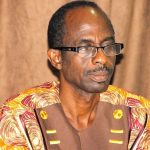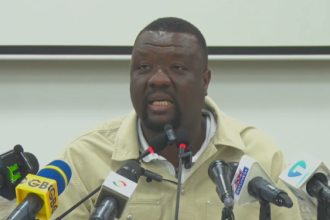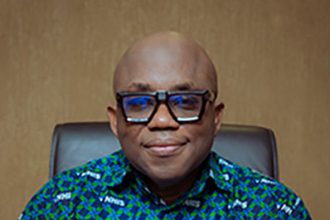Director-General of the National Communications Authority (NCA), Mr Joe Anokye, has extolled the impact of the Kwame Nkrumah University of Science and Technology (KNUST) in revolutionising technologies for maximum benefits in the modern era.
Mr Anokye highlighted the advancements and tremendous changes of KNUST since its inception and the adoption of disruptive technologies that make the institution a giant among its peers.
“The story of KNUST in the liberalisation era is a testament to the transformative power of free markets and competition. It highlights how breaking down barriers can unleash a wave of disruptive innovation and progress, changing the fortunes of institutions and individuals alike. Today, KNUST stands as a symbol of this transformation, basking in the waves of change brought about by liberalisation,” Mr Anokye, a geodetic engineer and technology manager, said on Thursday, November 22.
Mr Anokye, a former senior telecommunications consultant at the National Aeronautics and Space Administration (NASA) in the United States, was the speaker at the 12th Dr Robert Patrick Baffour Memorial lecture series at KNUST.
The former NASA routed data mission services manager, an alumnus of KNUST, was selected among a few renowned individuals who have made significant global contributions and excelled in various fields.
He delivered a three-part lecture series on the theme: KNUST After 70: A New Age for a Renewed Focus in an Era of Disruptive Technologies.
In an era of explosion of high-speed and vast bandwidth internet, artificial intelligence, and sophisticated inventions, Mr Anokye believes the topic “is as compelling as it is timely”.
He was convinced that the journey of the KNUST over the past seven decades stands as a testament to what vision, dedication, resilience, and collaborative spirit can achieve.
“From its foundational years to the unparalleled success stories of its alumni and faculty, KNUST has remained a beacon of knowledge, innovation, and academic brilliance in Ghana’s educational landscape,” he observed.
He was convinced that in an age dominated by disruptive technologies, “the role of educational institutions, particularly those with the legacy and stature of KNUST, is increasingly critical”.
Mr Anokye was confident that “with its legacy of excellence and innovation, KNUST is well-equipped to shape the future, ensuring that the next generation is not just ready to face the challenges but is empowered to redefine the future”.
He highlighted KNUST’s journey to the top and noted that “the illustrious legacy of KNUST isn’t merely anchored in its academic and infrastructural triumphs but is brought to life by the luminaries it has produced over the years”.
He cited Dr Thomas Mensah, a KNUST alumnus whose ground-breaking contribution to the development of fibre optics manufacturing and nanotechnology revolutionised global telecommunications, ushering in an era of seamless high-speed communications.
Again, Prof. Francis Allotey, a faculty member of KNUST, who gained global recognition for his ‘Allotey Formalism’, a technique used to determine matter in outer space.’
As well as Ibrahim Mahama, founder of Red Clay Studio based in Tamale.
Perhaps he is best known for his large-scale works from jute sacks and other artistic expressions.
In 2015, Mahama gained international attention when he used jute sacks to encase public structures in Athens and a long outdoor corridor in the Arsenale complex at the Venice Biennale.
“Overall, KNUST has played a pivotal role in societal transformation. Notable alumni have taken up leadership roles, contributing to policy making, governance, and socio-economic development. They have helped to shape various sectors, from technology and economics to healthcare and governance, demonstrating the multi-faceted impact of KNUST on society.
“Beyond individual achievements, the KNUST alumni community collectively has pioneered businesses, Civil Society Organizations, and initiatives driving socio-economic progress in Ghana and beyond. They have been at the forefront of technological revolutions, be it in the realm of AI, renewable energy, or tele- medicine,” he added.
He said the 2000s saw a significant shift towards digital communication systems at KNUST.
The university began to use email as a primary mode of communication among students, faculty, and staff.
The introduction of Learning Management Systems (LMS) such as Moodle allowed for online course delivery and assessment.
“In recent years, KNUST has continued to invest in technology infrastructure to support its academic programs. The university has implemented a wireless network across campus, which allows students and faculty to access the internet from anywhere on campus.
“Additionally, KNUST has set up an e-learning centre called: KNUST E-Learning. It is a virtual academic space that provides various resources to augment the learning experience of students and lecturers. The resources include a virtual classroom, online exams, video chat and conferencing, web room conferences, electronic information resources, and many more.
“Today, KNUST continues to invest in technology infrastructure to support its academic programs and provide students with cutting-edge technologies”.
Mr Anokye didn’t conclude without praising Focus FM, the campus radio run by students and faculty, which provides a platform for knowledge sharing, fostering a sense of community, and nurturing budding journalists and radio personalities.
As KNUST marks its 70th anniversary, Mr Anokye said: “The onus rests on us to rekindle Dr R. P. Baffour’s flame of visionary leadership, ensuring that KNUST remains illuminated, guiding not just Ghana but the entire African continent into an era where technology is not just adopted, but innovated, understood, and pioneered, here, within our revered walls”.
He praised “the great vision and dynamic leadership” of Dr R. P. Baffour, KNUST’s first Vice-Chancellor.
“It was under his watch that the Kwame Nkrumah University of Science and Technology (KNUST) not only witnessed remarkable transformation but also cemented its legacy as a leading institution in Africa,” Mr Anokye observed.
Details about the Dr R.P. Baffour Memorial Lectures
The R.P. Baffour Memorial Lectures were inaugurated in 1977 to commemorate the life and contributions of Dr. Robert Patrick Baffour. The lectures are designed to promote scholarly debate on issues of national and international importance.
Dr Baffour was a Ghanaian engineer, politician, and university administrator who served as the first Vice-Chancellor of the Kwame Nkrumah University of Science and Technology from 1961 to 1967. He was also a pioneer in engineering education in Ghana.
Robert Patrick Baffour (a.k.a. Papa Andoh) was born in Elmina on May 14, 1912.
His father was in the service of the British Civil Service in Nigeria as a Master of Schools. He was the first-born son of Robert Patrick Baffour Andoh and Maria Frederica Adwoa Kane (Okai).
Between 1917 and 1926, Baffour attended various schools in Ghana and Nigeria: Catholic School in Elmina, Okar Government School in Nigeria and Richmond College.
Baffour attended the Mfantsipim School and obtained the Cambridge Senior School Certificate with exemption from London Matriculation. After secondary school, he achieved the singular honour of coming first in the Civil Service Examination of his time.
Yet, instead of joining the British Civil Service, he chose to continue his education at Achimota College to study engineering, where he was taught by Charles Deakin, a founding engineering instructor at the school. He became the first Ghanaian to obtain a University of London degree in mechanical engineering on Ghanaian soil.
















